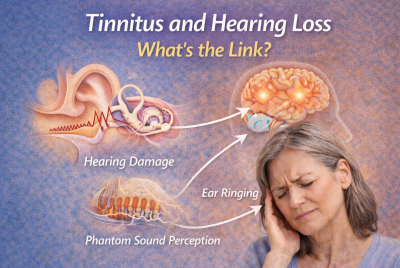Zinc Cured My Tinnitus
Discover how Zinc cured my tinnitus. Explore the intriguing journey, scientific insights, and expert advice on zinc’s role in tinnitus relief. Living with tinnitus can be challenging. As someone passionate about hearing health and eager to provide helpful suggestions, I understand the frustration and impact it can have on your daily life. Hearing health is vital, and finding effective solutions for tinnitus is crucial. In my journey to seek relief, I discovered a surprising remedy that made a significant difference: zinc. In this “Zinc cured my tinnitus” article, as a researcher and advisor on hearing health, I will share some helpful suggestions and reasons why zinc can benefit tinnitus sufferers.
Understanding Tinnitus
Defining Tinnitus
Tinnitus refers to the perception of sound in the absence of any external auditory stimulus. It can manifest as a ringing, buzzing, humming, or hissing sound in the ears. Tinnitus affects millions of people worldwide and can vary in intensity and duration.
Common Causes Of Tinnitus
Tinnitus can stem from various factors, including exposure to loud noises, age-related hearing loss, ear infections, and certain medical conditions such as Meniere’s disease or temporomandibular joint disorder (TMJ). Stress, certain medications, and even a zinc deficiency may contribute to developing or worsening tinnitus.
Impact Of Tinnitus On Daily Life
Tinnitus can significantly impact a person’s quality of life. The constant presence of intrusive sounds can lead to sleep disturbances, difficulty concentrating, increased stress levels, and even emotional distress. Finding effective ways to manage tinnitus is essential to regain control and improve overall well-being.
Does Zinc Really Help Tinnitus?
Zinc supplementation has been explored as a potential treatment for tinnitus, given its role in the auditory system. Some studies have suggested that zinc deficiency might be linked to tinnitus in specific populations. However, the evidence is mixed. While some research has found that zinc supplementation can benefit those with tinnitus-related zinc deficiencies, other studies have found no significant improvement. It’s crucial to approach the topic with caution. Over-supplementation can lead to negative side effects. Before considering zinc or any supplement as a remedy, it’s essential to consult with a healthcare professional to determine if a deficiency exists and to ensure the right dosage. In summary, while zinc might help some individuals with tinnitus, it isn’t a universal solution and should be pursued with guidance.
Can Lack Of Zinc Cause Tinnitus?
Zinc plays a crucial role in the auditory system, and a deficiency can sometimes be associated with tinnitus. Some studies suggest that individuals with tinnitus have lower zinc levels than those without the condition. However, it’s important to note that many factors can cause tinnitus, and zinc deficiency is just one potential contributor. If suspecting a deficiency, getting tested and not self-diagnose or self-treat is essential. While addressing a zinc shortage might help alleviate tinnitus symptoms for some, it’s not a guaranteed solution for everyone. Always consult a healthcare professional for proper guidance.
Exploring The Role Of Zinc
Overview Of Zinc And Its Functions
Zinc is an essential mineral that is crucial in various bodily functions. It is involved in immune function, DNA synthesis, wound healing, and the proper functioning of sensory organs, including the ears.
Research Linking Zinc Deficiency And Tinnitus
Several studies have highlighted the association between zinc deficiency and tinnitus. Researchers have found that individuals with tinnitus often exhibit lower levels of zinc in their bodies compared to those without tinnitus. This connection suggests that zinc supplementation may have a positive impact on managing tinnitus symptoms.
Mechanisms Of How Zinc Can Help Cured Tinnitus
The exact mechanisms by which zinc helps alleviate tinnitus are not yet fully understood. However, it is believed that zinc’s antioxidant properties and its role in regulating neurotransmitters in the auditory system contribute to its positive effects. Zinc may help protect the delicate structures of the inner ear and reduce the hyperexcitability of auditory neurons, thereby diminishing the perception of tinnitus.
Research And Experimentation With Various Treatments
During my exploration, I stumbled upon the link between zinc and tinnitus relief. Intrigued by the promising research, I decided to experiment with zinc supplementation under the guidance of a healthcare professional.
Positive Effects Of Zinc Supplementation
To my surprise, zinc supplementation made a noticeable difference in tinnitus symptoms. The intensity of the ringing decreased, and moments of silence became more prevalent. Although individual results may vary, zinc proved to be a game-changer for tinnitus management.
Can Zinc Make Tinnitus Worse
Zinc is essential for many bodily functions, including those in the auditory system. While some studies suggest zinc supplementation might benefit individuals with tinnitus-related zinc deficiencies, it’s crucial to approach its use cautiously. Excessive zinc intake can lead to various side effects, like nausea, diarrhea, and stomach cramps. Though there isn’t concrete evidence that zinc directly worsens tinnitus, an imbalance of minerals, including an excess of zinc, could indirectly impact bodily systems and contribute to symptoms. It’s vital not to self-diagnose or self-treat. Always consult with a healthcare professional before taking any supplements to ensure they’re appropriate and safe for your specific situation.
Zinc-Rich Foods For Tinnitus Relief
List Of Foods High In Zinc
Incorporating zinc-rich foods into your diet can be an excellent way to support tinnitus relief. Foods such as oysters, beef, lamb, pumpkin seeds, spinach, and dark chocolate are rich sources of zinc.
Incorporating Zinc-Rich Foods Into The Diet
Adding zinc-rich foods to your meals can be both enjoyable and beneficial. Consider incorporating oysters into your seafood dishes, preparing beef or lamb stews, sprinkling pumpkin seeds on salads, or indulging in a square of dark chocolate as a satisfying treat.
Zinc Supplements For Tinnitus Management
Types Of Zinc Supplements Available
Zinc supplements come in various forms, including zinc gluconate, zinc citrate, and zinc picolinate. These supplements are readily available over the counter and can be found in most pharmacies or health food stores.
Recommended Dosage For Tinnitus Relief
When considering zinc supplementation for tinnitus relief, it is crucial to consult with a healthcare professional to determine the appropriate dosage. The recommended daily intake for zinc typically ranges between 8-15 mg, depending on factors such as age, sex, and overall health.
Precautions And Potential Side Effects
While zinc supplements can be beneficial, it is essential to use them responsibly. Excessive zinc intake can lead to adverse effects, including nausea, vomiting, and a weakened immune system. It is always best to follow the recommended dosage and seek professional guidance when incorporating any supplements into your routine.
What Type Of Zinc Is Best For Tinnitus?
The potential link between zinc and tinnitus primarily concerns zinc’s role in the auditory system. Different forms of zinc are available as supplements, including zinc gluconate, zinc citrate, zinc acetate, and zinc picolinate, among others. The efficacy of these forms can vary based on absorption rates and bioavailability. For tinnitus specifically, most research has yet to focus on which type of zinc is most effective. Instead, studies generally examine whether zinc supplementation can relieve tinnitus symptoms. If considering zinc as a potential remedy for tinnitus, the type might be less critical than ensuring an actual deficiency exists.
Always consult with a healthcare professional before starting any supplementation. They can guide the appropriate form and dosage of zinc, considering individual needs and potential interactions.
Lifestyle Changes For Tinnitus Relief
Stress and anxiety can exacerbate tinnitus symptoms. Engaging in stress-reducing activities such as meditation, yoga, deep breathing exercises, or pursuing hobbies can help alleviate tinnitus-related distress.
Avoiding Triggers And Loud Noises
Loud noises can worsen tinnitus. Protect your ears by avoiding environments with excessive noise or wearing earplugs in situations where loud sounds are unavoidable.
Regular Exercise And Its Impact On Tinnitus
Engaging in regular physical exercise can enhance overall well-being and potentially reduce tinnitus symptoms. Exercise promotes better blood circulation, which may contribute to improved ear health and potentially mitigate the impact of tinnitus.
Seeking Professional Help For Tinnitus
If tinnitus significantly affects your quality of life or persists despite lifestyle changes, it is advisable to seek professional help. An audiologist or ear, nose, and throat (ENT) specialist can conduct diagnostic tests and provide personalized treatment options. Diagnostic tests such as audiometry, tinnitus pitch matching, and tympanometry can help identify the underlying causes and characteristics of your tinnitus. These evaluations provide valuable insights that assist professionals in developing effective treatment strategies.
FAQs About Zinc Cured My Tinnitus
Can zinc completely cure tinnitus?
While zinc supplementation and dietary changes have shown promise in alleviating tinnitus symptoms for some individuals, they may not guarantee a complete cure. The effectiveness of zinc in tinnitus management can vary from person to person. It is essential to consult with a healthcare professional and explore a personalized approach to address your specific needs.
Are there any side effects of zinc supplementation?
Zinc supplements are generally safe for most individuals when used responsibly and in appropriate dosages. However, excessive zinc intake can lead to adverse effects such as nausea, vomiting, and a weakened immune system. Following recommended dosages and seeking professional guidance when incorporating supplements into your routine is crucial.
Can zinc deficiency cause ear ringing?
Zinc deficiency has been linked to tinnitus (ear ringing) in some studies, especially when levels are very low. However, it’s not a common cause, and supplementation only helps certain people with confirmed deficiency when diagnosed.
How much zinc should you take for tinnitus?
Some studies exploring tinnitus used zinc doses around 30–50 mg daily, but needs vary. Most adults should not exceed 40 mg per day unless advised by a healthcare professional after testing their zinc levels individually first.
Zinc Cured My Tinnitus – Conclusion
In conclusion, zinc cured my tinnitus. In my journey with tinnitus, I discovered the potential of zinc as a valuable tool in managing its symptoms. While everyone’s experience may differ, incorporating zinc-rich foods and considering zinc supplementation under professional guidance may offer relief. Additionally, adopting other lifestyle changes and seeking professional help can contribute to a comprehensive approach to tinnitus management.
Disclaimer
This article is for informational purposes only and does not substitute professional medical advice. Always consult a licensed healthcare provider before beginning new treatments, supplements, or exercise programs for tinnitus or related conditions.







